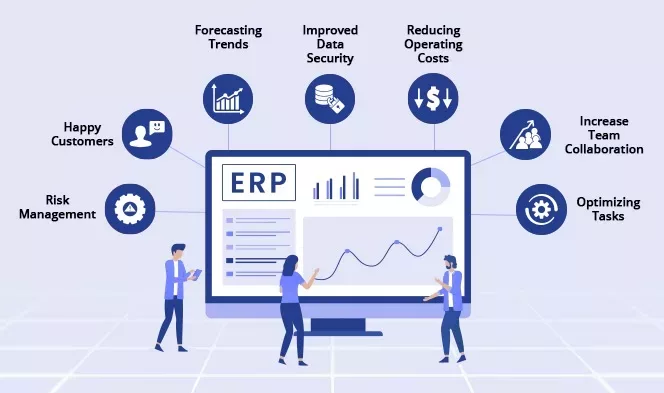Introduction to ERP Solutions
Enterprise Resource Planning (ERP) solutions have undergone a remarkable transformation from their early days as rudimentary inventory management systems.
These platforms have become the digital foundation for numerous businesses, smoothly incorporating finance, human resources, and supply chain management operations.
By doing so, modern SAP ERP helps organizations attain real-time visibility into their business data, which is crucial for optimizing operations and making informed decisions across different departments.
The continuous evolution of ERP systems highlights their pivotal role in today’s dynamic business environment. Companies that leverage these solutions can automate mundane tasks, thus freeing up valuable resources for more strategic initiatives. ERP solutions streamline operations and enhance a company’s agility and competitiveness in an ever-evolving marketplace.
Benefits of Modern ERP Systems
- Operational Efficiency: ERP systems automate routine tasks, reducing the required manual effort and significantly boosting productivity. Automated reporting, for example, can remove the need for hours of manual data input, enabling employees to concentrate on more crucial responsibilities.
- Data Accuracy: Centralized data management ensures that information remains consistent and accurate across the organization. It minimizes the likelihood of errors, promotes data integrity, and enhances decision-making processes. Exact data is invaluable for generating insightful reports that can guide strategic decisions.
- Scalability: One of the standout features of modern ERP solutions is their scalability. These platforms are designed to grow alongside your business, offering modular functionalities that can be easily added as required. This flexibility ensures that the ERP system meets the organization’s evolving needs.
Challenges ERP Solutions Face Today
Despite their numerous advantages, ERP systems are fraught with challenges. The increasing prevalence of cybersecurity threats necessitates robust security measures to protect sensitive business data.
Failure to safeguard this information can have devastating consequences, including financial loss and reputational damage. In addition to security concerns, the need for constant updates to keep systems running smoothly and securely can be both time-consuming and costly.
Another major hurdle is combining ERP systems with current business processes and other software solutions. It often requires specialized expertise and can lead to considerable initial setup costs.
For small to medium-sized enterprises, the investment of time and money needed for ERP implementation can be a substantial barrier. Therefore, selecting an ERP solution that aligns well with the company’s goals and offers a potential for a high return on investment (ROI) is critical.
Adaptations in ERP Solutions
ERP solutions are continually evolving and adapting to meet the needs of modern businesses. One significant change in this development is the move towards ERP systems that are based in the cloud. Cloud ERPs offer greater flexibility and lower upfront costs, making them particularly attractive for businesses of all sizes.
These systems provide enhanced security features and support more effortless scalability than traditional on-premise solutions. Cloud-based ERPs simplify updates and maintenance, reducing the administrative burden on IT departments.
Moreover, incorporating cutting-edge technologies like Artificial Intelligence (AI) and Machine Learning (ML) in ERP systems transforms how companies examine their data.
These technologies offer improved data analytics, allowing organizations to gain deeper insights into their operations and make more informed decisions. Through AI and ML, businesses can forecast trends, detect possible problems early on, and enhance their operational procedures.
Case Study: Successful ERP Implementation
A real-world example demonstrating the significant benefits of modern ERP solutions is a mid-sized manufacturing firm that transitioned to a cloud-based ERP system. Before the switch, the company struggled with inefficiencies and manual processes that hampered its growth.
After implementing the new ERP system, the firm experienced a 25% increase in operational efficiency within the first year. It automates tasks previously done manually, saving numerous hours of work and enabling employees to concentrate on more strategic projects.
Furthermore, the company saw a 15% reduction in costs attributed to streamlined operations and better resource allocation. The enhanced data accuracy and real-time visibility into business processes empowered the management team to make more informed decisions, driving the company’s growth.
This case study exemplifies how modern ERP solutions can significantly impact operational efficiency and cost savings, making them a valuable investment for businesses.
Future Trends in ERP
The future of ERP solutions is promising, with several emerging trends poised to redefine the landscape. One such trend is the integration of the Internet of Things (IoT) and 5G technology into ERP systems.
These advancements enable real-time data processing, creating more interconnected and efficient business environments. Implementing IoT and 5G will further enhance ERP capabilities, making them even more integral to business operations.
Additionally, incorporating advanced analytics and machine learning algorithms will enable ERP systems to offer predictive insights. These capabilities will help businesses anticipate market changes and respond proactively rather than reactively.
As a result, companies will be better positioned to navigate the complexities of the modern business landscape. The constant development of ERP systems ensures they stay ahead in technological advances, equipping businesses with the necessary tools for success.
Conclusion: The Evolving ERP Landscape
ERP solutions have evolved significantly, adapting to the changing needs of the business world. Companies seeking to enhance their operations find these tools essential because they can combine different business processes and offer immediate access to data.
Advancements in technology will further strengthen ERP systems, ensuring their significance and value. Investing in a contemporary ERP system that aligns with your company’s goals is essential for sustained success.
Businesses that use advanced ERP systems will have a competitive advantage in the constantly evolving business environment, helping them overcome challenges and seize opportunities for sustained growth and competitiveness.

